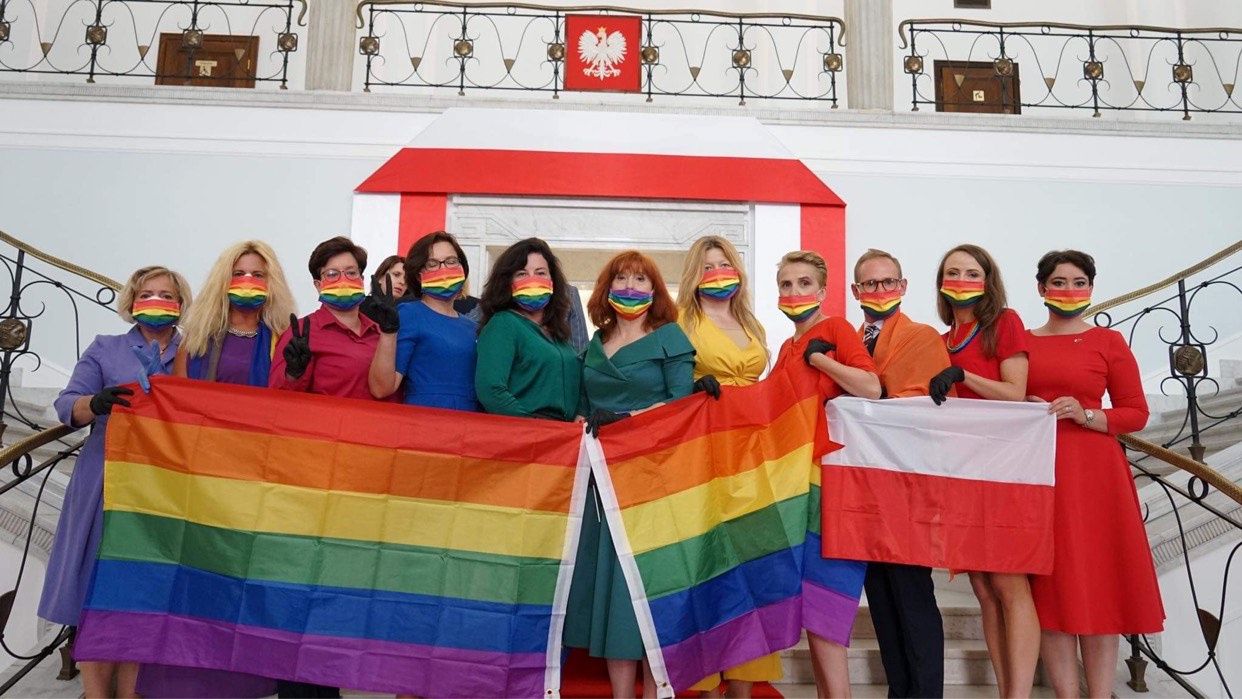News
August 06, 2020
A Polish rainbow: When Poland's ultra-conservative president Andrzej Duda was sworn in for his second term on Thursday, he was greeted by a show of colors, as members of the opposition coordinated their outfits to reflect the rainbow flag that symbolizes solidarity with the gay community. Duda, an ally of the nationalist ruling Law and Justice (PiS) party, who beat Warsaw Mayor Rafał Trzaskowski by a hair, made gay rights a major political issue in the campaign, repeatedly denouncing "LGBT ideology," as a threat to the nation. Meanwhile, several rural Polish towns that support PiS have declared themselves "LGBT free," prompting infuriated officials in Brussels to threaten to withhold EU funding. Indeed, this episode is just the latest flashpoint in the worst culture war in Poland since the end of the Cold War.
Macron's pledge to Lebanon: When French President Emmanuel Macron visited Beirut's shattered downtown on Thursday, he was swarmed by disillusioned Lebanese who had a clear message: "the people demand the fall of the regime." Visiting the former French colony, Macron met with Lebanese political forces from different factions, whose corruption, negligence, and mismanagement are to blame for Tuesday's explosions as well as the country's spiraling economic crisis. Speaking to Lebanese who swarmed the French delegation downtown — many of whom begged the French president to "please help us" — Macron pledged to create "a new political pact in Lebanon," and said he would return to the crisis-ridden country in September to follow up on its progress. Macron also vowed that the current flow of international aid will not be used to line corrupt politicians' pockets but will be directed towards rebuilding the battered capital. Will Macron succeed where successive internal and external efforts have repeatedly failed?
Brazil must protect Amazon tribes from pandemic: Whether he likes it or not — and evidently he does not — Brazilian President Jair Bolsonaro must take measures to protect his country's sizable indigenous population from the ravages of the coronavirus. The Supreme Court said as much in a ruling handed down on Wednesday, just hours after a well-known indigenous leader died of the disease. Last month, Bolsonaro — who has questioned the pandemic's severity and wants to see more development of the Amazon rainforest where many indigenous communities live— vetoed parts of a bill containing measures to protect those groups from the spread of COVID-19, citing budgetary concerns. The Supreme Court ruling is likely to inflame ongoing tensions between Bolsonaro (and his followers) and the courts.
More For You
- YouTube
GZERO World heads to the World Economic Forum in Davos, where Ian Bremmer lookst at how President Trump’s second term is rattling Europe, reshaping both transatlantic relations and the global economy, with Finland’s President Alexander Stubb and the IMF’s Kristalina Georgieva.
Most Popular
Think you know what's going on around the world? Here's your chance to prove it.
- YouTube
How widely is AI actually being used, and where is adoption falling behind? Speaking at the 2026 World Economic Forum in Davos, Brad Smith, Vice Chair and President of Microsoft, outlined how AI adoption can be measured through what he calls a “diffusion index.”
U.S. President Donald Trump holds a bilateral meeting with NATO Secretary General Mark Rutte at the World Economic Forum (WEF) in Davos, Switzerland, January 21, 2026.
REUTERS/Jonathan Ernst
After saying numerous times that he would only accept a deal that puts Greenland under US control, President Donald Trump emerged from his meeting with NATO Secretary General Mark Rutte singing a different tune.
© 2025 GZERO Media. All Rights Reserved | A Eurasia Group media company.
